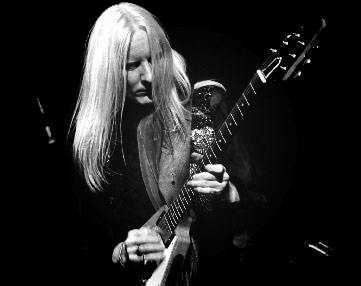Ask Johnny Winter By MICHAFL BENNETT Canadian Press Staff Writer Written For The Associated Press)
Can the white man sing the blues? Johnny Winter, an albino stomp-'n'-shout guitarist, can — but he says it's not the same as Lazy Lester or Lonesome Sundown did it. And it probably never will be again. "When the life style changes, the music's not goin' to be the same, because it was an emotional music that was kinda spawned in poverty, depression and ignorance," said Winter, a wispy, drawling Texan with silkfine, flowing hair. "And once the people got out of that, it got to be like an intellectual thing: 'Well, okay, the blues is part of our heritage, so we're going to keep doin' it,' but they won't feel the same way about it.
"It changed a whole lot from the time people were doin' it in Mississippi. They moved to Chicago and the postwar Chicago blues was a completely different music, a completely different blues than the milder softer Delta-type blues. "It might not die, it might live on, but it won't be the same way it was." Winter was weaned on blues and rock 'n' roll records in Beaumont, a sleepy Texas town just northeast of Houston. "I learned a lot from a black disc jokey at a black station in Beaumont called KJET radio," he said. "This guy had a show called the Bon Ton, show, Bon, Ton Roulle, the Good Times Roll. He called himself Parent-Clarence Garleau was his real name — or Bon Ton and he used to play all his own records.
"I used to call him up and ask him to play things for me. I met him in a music store one day — I was teachin' guitar and I was about 16, pickin' up a little extra bread. "He came in and I recognized the sound of his voice, never had met him, and I started playin' one of his tunes. It flipped him out. "In those days, the white people just didn't dig that kinda stuff. "But if black people really knew you were diggin' it or interested in it, it turned them on. "He was really extra nice, man. I'd go out on gigs and he'd make sure nobody killed me or anything and let me play with the band. He really helped me a lot." Winter served his softer Delta-type blues.
"It might not die, it might live on, but it won't be the same way it was." Winter was weaned on blues and rock 'n' roll records in Beaumont, a sleepy Texas town just northeast of Houston. "I learned a lot from a black disc jokey at a black station in Beaumont called KJET radio," he said. "This guy had a show called the Bon Tor, show, Bor, Ton Roulle, the Good Times Roll. He called himself Parent-Clarence Garleau was his real name — or Bon Ton and he used to play all his own records. "I used to call him up and ask him to play things for me. I met him in a music store one day — I was teachin' guitar and I was about 16, pickin' up a little extra bread.
"He came in and I recognized the sound of his voice, never had met him, and I started playin' one of his tunes. It flipped him out. "In those days, the white people just didn't dig that kinda stuff. "But if black people really knew you were diggin' it or interested in it, it turned them on. "He was really extra nice, man. I'd go out on gigs and he'd make sure nobody killed me or anything and let me play with the band. He really helped me a lot." Winter served his apprenticeship with Johnny and the Jammers, Gene Terry and Downbeats and It and Them, playing small beer and brawl bars throughout the South. He more recently has made four albums for Columbia Records, each of which has sold over a quarter of a million copies.
The most recent, "Johnny Winter and Live," is selling the best of the four. "Man, you wouldn't believe some of the clubs. Louisiana was where it was really heavy. And it was just exactly like Easy Rider, exactly, man. "People would come up: 'Hey, man, play "Midnight Hour'. " "Midnight Hour" Man we've already played that three times. "Or they'd come up and ask for something you didn't know. "You couldn't explain you didn't know the song. Nothin' made any difference. "Those people got pleasure outta goin' out, gettin' real drunk, lookin' for chicks and fightin'." B. B. King remembers the night this frail-looking white kid walked into the Raven and stole the show seven years ago.
"It was about 10:30 and four or five white cats came in," said King. "I was havin' trouble with the internal revenue boys then and I figured: "Oh, oh, here it comes!" "Somebody said: "This is Johnny Winter, let him play some." "Now I don't let nobody do that because this is my livin'. Then I thought: "If I was in an all-white club and they didn't let me play, I'd think it was another racial thing." "So I asked him if he was sure he could play. I went to my drummer and said: "One number, that's all, I don't want to blow the gig." "Man, he played so good he set the people on fire. I told him if he kept goin', he'd do allright
Source & Full Article: 71-08-17 Red Bluff, CA.pdf
